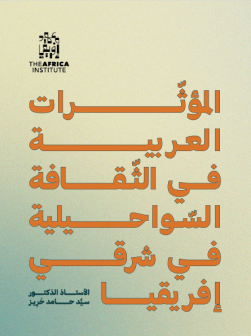This book focuses on introducing Kiswahili culture and examines various aspects related to it, such as its origins and development, as well as some of its social, linguistic, and literary characteristics. This exploration is approached from the perspective of interaction and engagement, generally, and within the context of African and Arab-Islamic relations, specifically. While Kiswahili culture is closely linked to the Kiswahili language—an African language primarily in terms of its structure and composition—it has also been nourished by African roots, developing and maturing in Africa, firmly rooted in its heritage in a way that affirms its African identity.
In addition to the local elements associated with Bantu culture and languages that have integrated into Kiswahili culture, there are also cultural components and influences from other African groups, such as the Nubians and Ethiopians, among others. This has given Kiswahili culture an African dimension characterized by inclusivity, transcending narrow local confines.
Besides the local elements associated with Bantu culture and languages that have integrated into Kiswahili culture, there are also cultural components and influences from other African groups, such as the Nubians and Ethiopians. This has given Kiswahili culture an African dimension characterized by inclusiveness, escaping the confines of narrow localism.
Professor Sayyid Hamid Hurreiz was born in 1942 in Burri, Khartoum. He graduated in the University of Khartoum; Faculty of Arts, with a degree in English and was then sent to England, where he earned a Higher Diploma in Applied Linguistics at the University of Edinburgh, a Master’s in Folklore at the University of Leeds, and a Ph.D. in Folklore at Indiana University. He served as the founding Director of the East Africa Center for Heritage and Oral History in Zanzibar and the United Arab Emirates and has worked as a visiting professor in research and teaching at several American universities, including Indiana University, Idaho University, and Northwestern University, in addition to universities in the UAE and Oman. He was the Dean of the Institute of African and Asian Studies at the University of Khartoum for over two decades and the Dean of Graduate Studies at the International University of Africa for eight years. Dr. Hurreiz has made significant contributions to Sudanese culture throughout his academic career and has numerous publications in folklore and languages. He is currently a Professor at the College of Languages, International University of Africa, Sudan.
This book is available for purchase at The Africa Institute’s bookshop, Meroë.
This book focuses on introducing Kiswahili culture and examines various aspects related to it, such as its origins and development, as well as some of its social, linguistic, and literary characteristics. This exploration is approached from the perspective of interaction and engagement, generally, and within the context of African and Arab-Islamic relations, specifically. While Kiswahili culture is closely linked to the Kiswahili language—an African language primarily in terms of its structure and composition—it has also been nourished by African roots, developing and maturing in Africa, firmly rooted in its heritage in a way that affirms its African identity.
This book focuses on introducing Kiswahili culture and examines various aspects related to it, such as its origins and development, as well as some of its social, linguistic, and literary characteristics. This exploration is approached from the perspective of interaction and engagement, generally, and within the context of African and Arab-Islamic relations, specifically. While Kiswahili culture is closely linked to the Kiswahili language—an African language primarily in terms of its structure and composition—it has also been nourished by African roots, developing and maturing in Africa, firmly rooted in its heritage in a way that affirms its African identity.
In addition to the local elements associated with Bantu culture and languages that have integrated into Kiswahili culture, there are also cultural components and influences from other African groups, such as the Nubians and Ethiopians, among others. This has given Kiswahili culture an African dimension characterized by inclusivity, transcending narrow local confines.
Besides the local elements associated with Bantu culture and languages that have integrated into Kiswahili culture, there are also cultural components and influences from other African groups, such as the Nubians and Ethiopians. This has given Kiswahili culture an African dimension characterized by inclusiveness, escaping the confines of narrow localism.
Professor Sayyid Hamid Hurreiz was born in 1942 in Burri, Khartoum. He graduated in the University of Khartoum; Faculty of Arts, with a degree in English and was then sent to England, where he earned a Higher Diploma in Applied Linguistics at the University of Edinburgh, a Master’s in Folklore at the University of Leeds, and a Ph.D. in Folklore at Indiana University. He served as the founding Director of the East Africa Center for Heritage and Oral History in Zanzibar and the United Arab Emirates and has worked as a visiting professor in research and teaching at several American universities, including Indiana University, Idaho University, and Northwestern University, in addition to universities in the UAE and Oman. He was the Dean of the Institute of African and Asian Studies at the University of Khartoum for over two decades and the Dean of Graduate Studies at the International University of Africa for eight years. Dr. Hurreiz has made significant contributions to Sudanese culture throughout his academic career and has numerous publications in folklore and languages. He is currently a Professor at the College of Languages, International University of Africa, Sudan.
This book is available for purchase at The Africa Institute’s bookshop, Meroë.

The Africa Institute (Sharjah, UAE)
Arabic
978-9948-767-67-1
16 x 21 cm, paperback
AED 24 | $6.40
2024
Contact usSubscribe to our mailing list and get the latest news from The Africa Institute